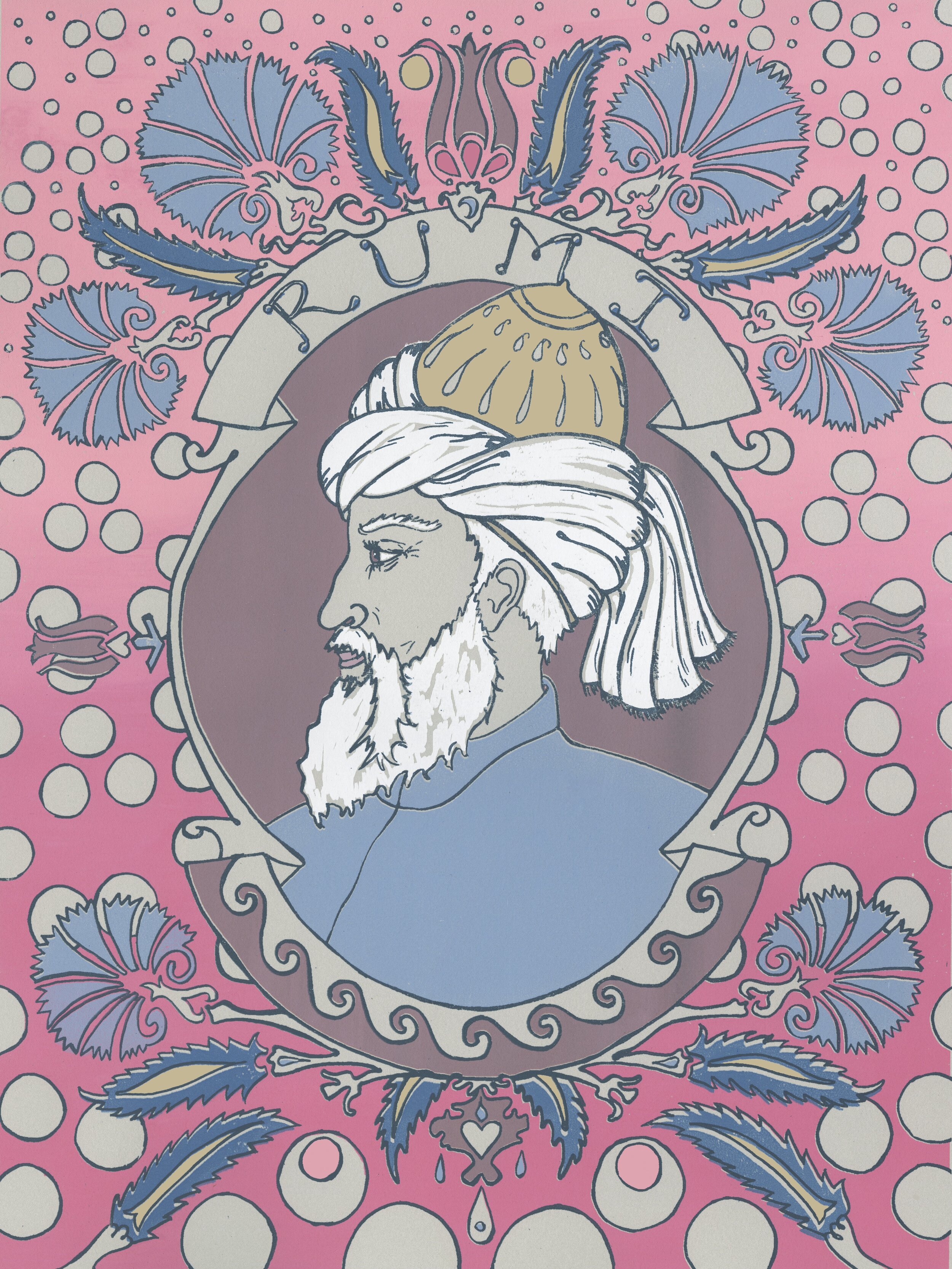The following is a sample profile from the book Holy Troublemakers & Unconventional Saints by Daneen Akers.
Rumi
In the early morning light in Konya, Turkey in 1248, a man walks slowly around a column in his courtyard. His left palm rests gently on it, and he walks around and around, over and over again. He is in deep grief. His close friend and teacher, a man he loved deeply, has disappeared without any explanation.
The rhythm of turning around this pole gives him some comfort as he weeps for his friend. He continues to turn, almost hypnotically, as the spinning motion helps his mind transcend his grief. Gradually, he begins speaking lines of poetry that are full of longing and sorrow. He’s speaking of his own grief, and he’s also speaking about what it’s like to be human and live in a state of nostalgia, missing our Divine creator and wanting union with the universe. His students begin to write down the poems that pour out of this grieving man, and before long, there are thousands and thousands of poems about life, sorrow, love, and the longing each human feels for unity with the “immortal Beloved.”
This man is Jalal al-Din Rumi, known now in the West simply as Rumi. He was a scholar, teacher, poet, and philosopher who lived 800 years ago, but he’s still the most read poet in English-speaking countries, even though all of his poems were written in Persian.
Illustration by Helen Quinn
Rumi was born on September 30th in 1207 in what is now Afghanistan, but when he was still a child, his family had to flee the oncoming army of Genghis Khan. They ended up settling in Konya, Turkey, which was a major stop on the Silk Road and a city where many cultures and religions intermingled. Rumi’s father was a Muslim teacher from the mystical branch of Islam called Sufism. Sufis seek direct communion with God through certain rituals and practices such as meditation, chanting poetry or scripture, singing, and sometimes dancing.
When his father died, Rumi became the spiritual leader of the local Sufi learning community. His students respected him, and he was widely read. But one day, on the road, he met a wandering dervish, or Sufi teacher, named Shams of Tabriz. Shams was 20 years older than Rumi and had been looking for a student with whom he could share his wisdom. Rumi was that student, ready to turn his book learning into something real. Soon they were disappearing for days, deep in mystical conversations.
Some people today think Rumi and Shams were in love romantically, too, and that’s a possibility, but it’s hard to know. Students and mentors often had incredibly close relationships in Persian culture. Their conversations were about the spiritual journeys of humans seeking union with God.
Jealousies arose within the community of Rumi’s students over the time spent with Shams. Nobody knows for sure what happened, but Shams disappeared. Maybe he was killed by a jealous student, or maybe he wanted to teach Rumi a final lesson about separation.
No matter what transpired, Rumi was left with heartache. But the insights Rumi found in his grief still land in our souls today as truth. He wrote several books of poetry in the years following Sham’s disappearance. A few of Rumi’s most enduring verses include these:
“As you start to walk on the way, the way appears.”
“Let yourself be drawn by the stronger pull of that which you truly love.”
“The wound is the place where the Light enters you.”
“Stop acting so small. You are the universe in ecstatic motion.”
“Let the beauty we love be what we do. There are hundreds of ways to kneel and kiss the ground.”
Although Rumi died in 1273, the thousands and thousands of verses of poetry he wrote while turning around that column in his courtyard are still read. The rhythmic turning Rumi did around the fixed point of the column in his courtyard inspired a ritual still practiced by his students today.
The Sufi school that traces its origins back to Rumi is called the Mevlevi Order. More popularly, they are known as “whirling dervishes.”Dressed in long white robes and conical hats, Rumi’s students whirl in rhythmic form to traditional Persian music which uses stringed instruments, reed flutes, tambourines, and drums to create a repetitive sound a bit like a human heartbeat that allows people to enter into a deep kind of religious concentration.
The whirling dervishes gradually begin to spin to the left, because the human heart is on the left side of the body. Often their right hands go up towards the sky to receive God’s love while their left arms go down to share God’s love with others. Their skirts spin out into large circles as they whirl around and around. It’s a mesmerizing sight.
They are a living poem, a moving meditation. Symbolically, they are turning towards truth and towards God while turning away from their own egos. As Rumi said, “My soul is from elsewhere, I’m sure of that, and I intend to end up there.”
How might writing a poem or singing a song help you when you are feeling sad?
Glossary Terms
Culture
The customary beliefs, traditions, art, food, dress, and ideas of a particular people and place.
Dervish
A Sufi Muslim who has taken a vow of poverty is called a dervish; dervishes began appearing in the 12th century. Whirling dervishes are a particular order of dervishes who spin as a form of worship, a practice that was started by the Persian Sufi poet, Rumi.
Genghis Khan
The founder of the Mongol Empire (situated between Russia and China) in the 13th century, known for the brutality of his military campaigns.
Immortal Beloved
One of the names for the Divine presence of God used frequently by the poet Rumi.
Meditation/Meditate
Thinking deeply or quietly focusing one’s mind for a period of time for religious or spiritual purposes or to relax.
Mentor
An experienced and trusted adviser.
Muslim
A follower of the religion of Islam.
Mystical
Spiritually symbolic or having a hidden meaning; something outside of the physical senses.
Silk Road
A network of trade routes that went along the northern borders of China and India and ended in Eastern Europe, beginning in the 2nd century; it connected many empires for trade and commerce.
Spiritual
Something that relates to the human soul or spirit.
Spiritual Journeys
The stories of people’s connection with their faith, spirituality, or religion; for example, “Tell me about your spiritual journey since becoming a Muslim.”
Sufi/Sufism
A person who is part of the mystical branch of Islam called Sufism; Sufis seek direct communion with God through certain rituals and practices such as meditation, chanting poetry or scripture, singing, and sometimes dancing or whirling.
West/Western
The “Western world,” during Roman Antiquity meant Italy and the countries west of it; today it generally refers to places where most people speak European languages such as English, French, and German.
Watch Daneen read Rumi’s profile in our weekly Online Story Time.
Read another sample chapter from the Holy Troublemakers & Unconventional Saints book by Daneen Akers.



